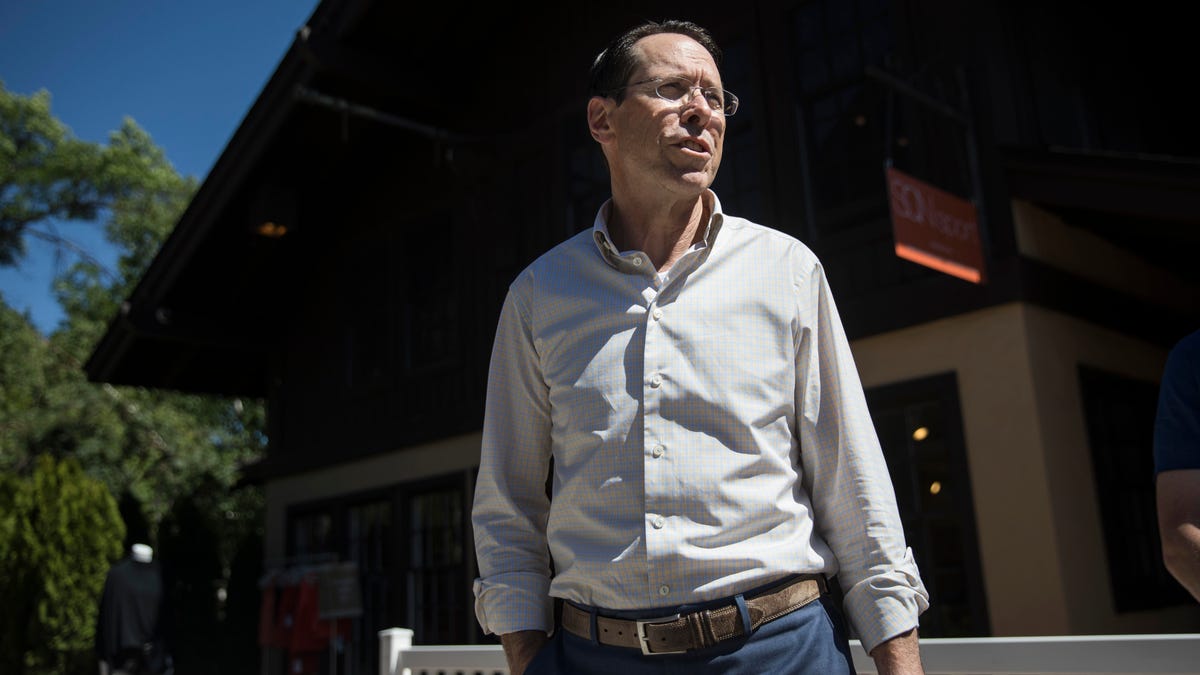AT&T CEO calls for privacy, net neutrality laws
Randall Stephenson also calls 5G "critical" to the future of media consumption.

AT&T CEO Randall Stephenson spoke Monday at the Wall Street Journal's tech conference.
Washington may not "agree on the freezing point of water," as AT&T's CEO put it, but it should pass legislation to protect consumer privacy and net neutrality .
Randall Stephenson, speaking Monday at the Wall Street Journal D.Live conference in Laguna Beach, California, called for Congress to figure out a way to protect consumers.
"I'd love to see legislation, not regulation," he said. Stephenson noted that companies shouldn't be able to block content or throttle users. Consumers should be able to connect any devices to a network that they want, and they should know how their data is being used, if it's sold and if they have control over it, he said.
The Obama era rules for the open internet proved short-lived, lasting briefly from 2015 to 2018. But the battle rages in the courts as supporters challenge the repeal of the rules and the Federal Communications Commission challenges states that are passing their own net neutrality rules.
Many people agree with the basic principle of net neutrality -- the idea that all traffic on the internet should be treated equally -- but plans for realizing that uncontroversial concept have been a lightning rod for conflict. Behind the clash: The former, Democrat-led FCC reclassified broadband networks so that they were subject to the same strict regulations that govern telephone networks. Supporters claim that was necessary for establishing the legal basis of the rules. But it provoked a backlash from Republicans, who said the move was clumsy and blunt.
On June 11, the Obama era rules went away.
AT&T, meanwhile, is in the midst of a transformation from a pure telecom company into a media powerhouse, thanks to its acquisition of DirecTV and Time Warner. The company has laid out its vision of not only creating content, but delivering that programming to consumers no matter where they are.
To that end, AT&T's other big bet is on 5G . The company is poised to be the first to launch a mobile 5G network, with a target of turning on the service in a dozen markets this year. Like the other carriers, AT&T is hyping up 5G as the next big revolution in technology, one able to support other tech trends like the Internet of Things and self-driving cars .
The company last month showed off a Netgear wireless hotspot, which will be the first 5G device in the market. There's a race to get to 5G first as a form of bragging rights and a declaration of network superiority, which the companies hope will translate into customer growth down the line.
AT&T could use the boost. Its core wireless business faces tons of pressure from upstart T-Mobile . The company has routinely trailed the pack in subscriber growth, and while rival Verizon has better held up against T-Mobile's competitive pressure, AT&T remains vulnerable.
The company has tried to shore up those losses by bundling in streaming services. The company already has launched DirecTV Now , a stripped down set of channels called AT&T Watch, and already has channel-specific services like HBO Now. Stephenson has hinted at another service anchored by HBO to launch next year.
On Monday, Stephenson reiterated that he wants to invest more in HBO, to help its grow its programming slate. He also criticized President Donald Trump's decision to remove the press credentials of CNN reporter Jim Acosta last week after a contentious press conference
"We've got an interesting situation going on here," Stephenson said. "If the White House wants to pull somebody's press credentials, there is a process ... There's been no process followed to remove his credentials."
Stephenson also called 5G "critical" for the future of media and content consumption. Instead of wearing a bulky headset for VR, you could have a piece of glass covering your face that's more like regulator glasses, he said.
"All of a sudden you have instantaneous networks," he said. "You have networks that are instantly powerful ... It changes everything. It turns the world immediate."
CNET's Roger Cheng and Maggie Reardon contributed to this report.
CNET's Holiday Gift Guide: The place to find the best tech gifts for 2018.
Best Black Friday 2018 deals: The best discounts we've found so fa
CNET's Gift Guide: The best place to find the perfect gift for everyone on your list this season.
5G is your next big upgrade: Everything you need to know about the 5G revolution.

